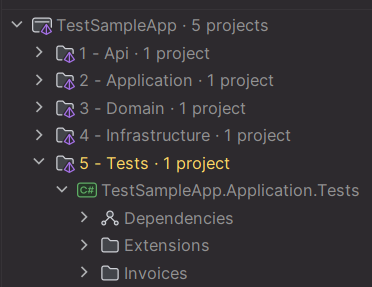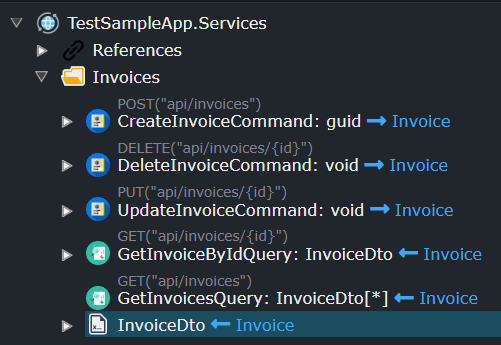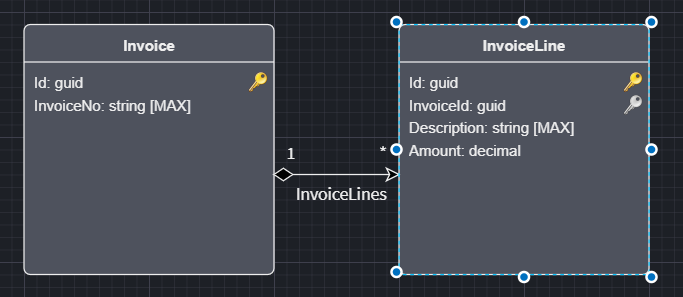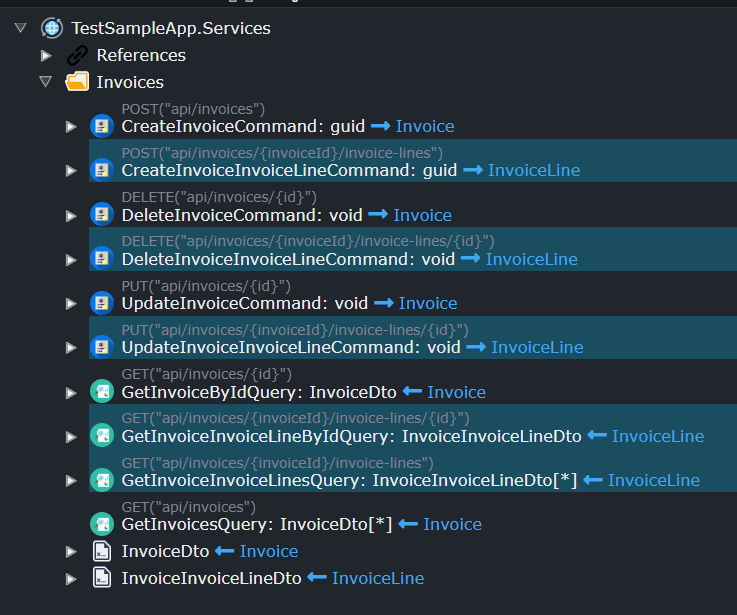Intent.Application.MediatR.CRUD.Tests
This module generates unit tests for using XUnit, NSubstitute, FluentAssertions and AutoFixture.
Some of the terms used in this module:
- SUT - System Under Test.
Where are the tests generated?
Once this module is installed and the Software Factory executed, you will notice a new solution folder and project like this in your IDE:

What kind of tests are generated?
This module only targets the MediatR CRUD services like this:

Only the mapped Commands and Queries that can be identified as CRUD-based services are selected for generating tests to test their respective Command/Query handlers.
There are the following kinds of tests available:
- Create Handler Tests
- Update Handler Tests
- Delete Handler Tests
- Get-By-Id Handler Tests
- Get-All Handler Tests
- Paginated-Get Handler Tests
- Fluent Validation Tests
All of the above (except the paginated and fluent validation tests) will have tests also for nested entities.
Nested Entities can be explained like this. If I have a domain like this:

I can generate CRUD services like this:

Those services will also have unit tests generated.
Examples of Unit Tests
CreateInvoiceCommandHandlerTests (Command Handler Test)
This does a positive-test against the Command Handler.
public class CreateInvoiceCommandHandlerTests
{
public static IEnumerable<object[]> GetSuccessfulResultTestData()
{
var fixture = new Fixture();
yield return new object[] { fixture.Create<CreateInvoiceCommand>() };
}
[Theory]
[MemberData(nameof(GetSuccessfulResultTestData))]
public async Task Handle_WithValidCommand_AddsInvoiceToRepository(CreateInvoiceCommand testCommand)
{
// Arrange
var invoiceRepository = Substitute.For<IInvoiceRepository>();
var expectedInvoiceId = new Fixture().Create<System.Guid>();
Invoice addedInvoice = null;
invoiceRepository.OnAdd(ent => addedInvoice = ent);
invoiceRepository.UnitOfWork
.When(async x => await x.SaveChangesAsync(CancellationToken.None))
.Do(_ => addedInvoice.Id = expectedInvoiceId);
var sut = new CreateInvoiceCommandHandler(invoiceRepository);
// Act
var result = await sut.Handle(testCommand, CancellationToken.None);
// Assert
result.Should().Be(expectedInvoiceId);
await invoiceRepository.UnitOfWork.Received(1).SaveChangesAsync();
InvoiceAssertions.AssertEquivalent(testCommand, addedInvoice);
}
}
Note
GetSuccessfulResultTestData can be Intent-Ignored in order for user-defined tests data to be supplied.
CreateInvoiceCommandValidatorTests (Fluent Validation Test)
This does both positive and negative test cases against the Fluent Validator for the Command Handler.
public class CreateInvoiceCommandValidatorTests
{
public static IEnumerable<object[]> GetSuccessfulResultTestData()
{
var fixture = new Fixture();
var testCommand = fixture.Create<CreateInvoiceCommand>();
yield return new object[] { testCommand };
}
[Theory]
[MemberData(nameof(GetSuccessfulResultTestData))]
public async Task Validate_WithValidCommand_PassesValidation(CreateInvoiceCommand testCommand)
{
// Arrange
var validator = GetValidationBehaviour();
var expectedId = new Fixture().Create<System.Guid>();
// Act
var result = await validator.Handle(testCommand, (c) => Task.FromResult(expectedId), CancellationToken.None);
// Assert
result.Should().Be(expectedId);
}
public static IEnumerable<object[]> GetFailedResultTestData()
{
var fixture = new Fixture();
fixture.Customize<CreateInvoiceCommand>(comp => comp.With(x => x.InvoiceNo, () => default));
var testCommand = fixture.Create<CreateInvoiceCommand>();
yield return new object[] { testCommand, "InvoiceNo", "not be empty" };
}
[Theory]
[MemberData(nameof(GetFailedResultTestData))]
public async Task Validate_WithInvalidCommand_FailsValidation(
CreateInvoiceCommand testCommand,
string expectedPropertyName,
string expectedPhrase)
{
// Arrange
var validator = GetValidationBehaviour();
var expectedId = new Fixture().Create<System.Guid>();
// Act
var act = async () => await validator.Handle(testCommand, (c) => Task.FromResult(expectedId), CancellationToken.None);
// Assert
act.Should().ThrowAsync<ValidationException>().Result
.Which.Errors.Should().Contain(x => x.PropertyName == expectedPropertyName && x.ErrorMessage.Contains(expectedPhrase));
}
private ValidationBehaviour<CreateInvoiceCommand, System.Guid> GetValidationBehaviour()
{
return new ValidationBehaviour<CreateInvoiceCommand, System.Guid>(new[] { new CreateInvoiceCommandValidator() });
}
}
Note
GetSuccessfulResultTestData, GetFailedResultTestData can be Intent-Ignored in order for user-defined tests data to be supplied. GetValidationBehaviour can also be Intent-Ignored in order to control how a Validator is constructed especially when user-defined services are being injected in the constructor.